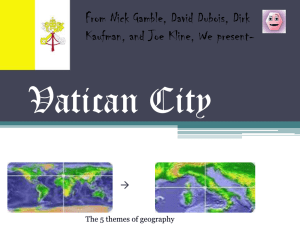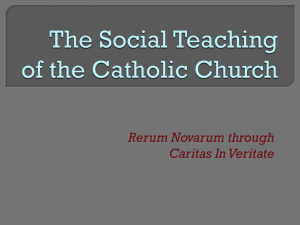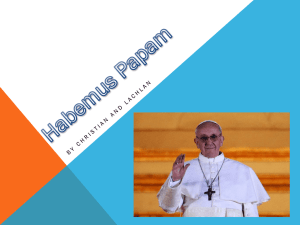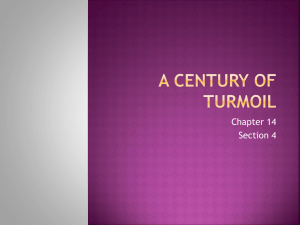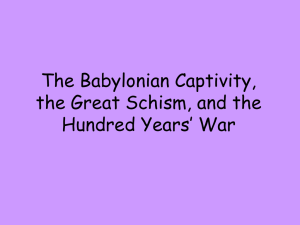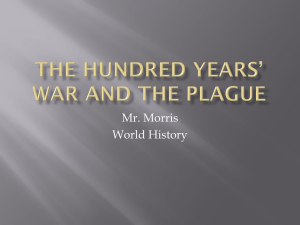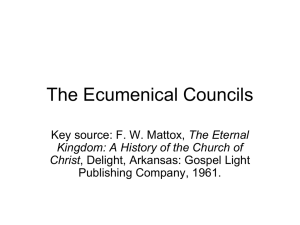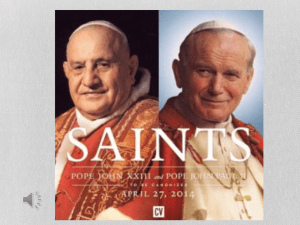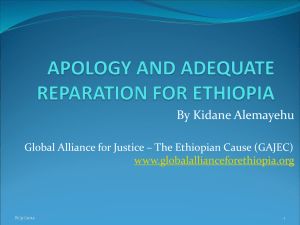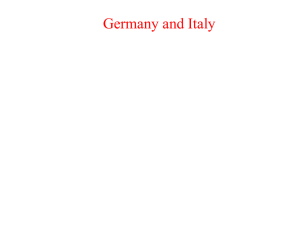What is an Ecumenical Council? - Blessed John XXIII Parish Website
advertisement
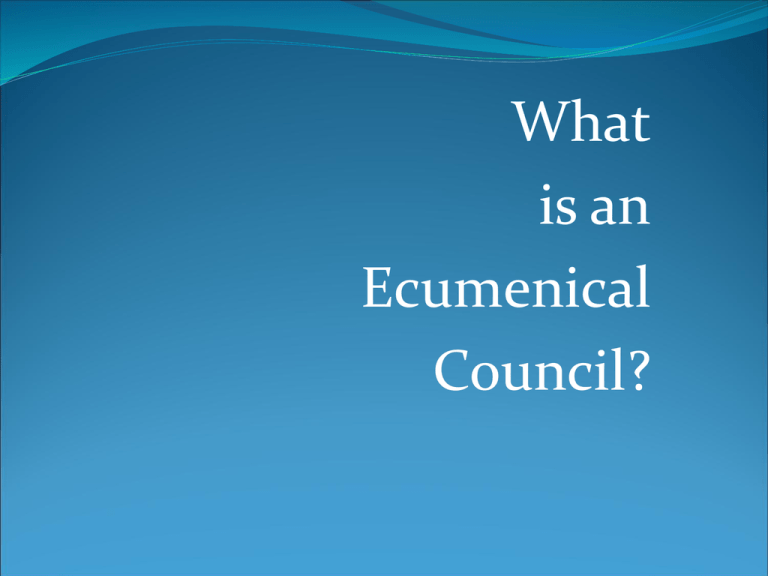
What is an Ecumenical Council? What is an Ecumenical Council? A council is a solemn assembly of church leaders, usually bishops, to discuss and determine the Church’s position on different issues. In the early Church, councils were both local and regional. What is an Ecumenical Council? Ecumenical comes from two Greek words oikoumenē (“the inhabited world”) and oikos(“house”) What characteristics determine an Ecumenical Council from a local Council? Solemn assembly of bishops of universal Church Convoked and presided over by Pope Council deals and addresses matters that deal with whole Church What is an Ecumenical Council? Prototype for Church Council Council of Jerusalem Acts 15 is prototype for Councils Determine if gentiles need to become Jews before becoming Christian Determine if gentile males needed to be circumcised Source of division in Church – especially between Peter and Paul Council called to resolve issue and preserve the unity of the Church Church leaders gather, meet in prayer, discuss and decide. Council is a FAITH event Maintaining unity of faith and practice is a major objective of a council so that “all may be one” Blessed John XXIII Parish Moto! What is an Ecumenical Council? Validity & Importance of Ecumenical Councils Council as Faith Event: The Church holds that when all the elders of the Church gather to make decisions that the assistance of the Holy Spirit is not lacking; and that a council is an expression of the apostolic charisma of the bishops; the Holy Spirit guides them in a special way in their teaching due to their office (Matthew 28: 20 I will be with you always & John 14:26 the Holy Spirit, whom the Father will send in my name, will teach you all things Early Church Fathers view of Councils: St. Augustine compares the authority of the council to the authority of the apostles St. Gregory the Great affirmed the first four councils of the Church to the authority of the Four Gospels What is an Ecumenical Council? Three Characteristics of an Ecumenical Council Summoning – all bishops summoned; not necessary that all bishops attend, but as long as they are summoned; Number – the number who attend does not determine if Council can proceed or not; there is no quota required; only all summoned and given reasonable time to be able to attend so for example at the beginning of the Council of Trent only 4 cardinals, 4 archbishops and 20 bishops attended the opening of the Council. Many stayed away as felt the Council would have little or no effect; but since every church leader summoned – the Council opened; by final session of the Council of Trent majority of bishops were in attendance. Papal Affirmation – the teaching of the Council necessary to be affirmed by the Pope; universal authority recognized; Papacy critical even if Pope is not in attendance What is an Ecumenical Council? Matters that Concern Whole Church Defining & Explaining Doctrine Church Life, Practice and Discipline Church’s relationship with State/Society & Church’s Role in the World Local councils (Bishops Conferences in today’s Church) deal with implementation of Church teachings & local pastoral concerns that can hinder & effect faith of local Church What is an Ecumenical Council? First Four Councils of Church– Council of Nicaea Not convoked by Pope, but by Emperor Not all bishops attended Pope not present at Council, but had representatives there Yet considered Ecumenical as: All bishops summoned Reasonable effort made for all to attend Pope ratified outcome of Council What is an Ecumenical Council? Council of Nicaea 325 Ad Trinitarian Issue – Father, Son & Holy Spirit Nature of Jesus & Arian Heresy Date for Easter calculated differently from Jewish Passover Early Church Canons promulgated. Comments: Council convoked by Emperor Constantine I 1800 bishops invited; est 220 – 320 attended Bishop of Rome not in attendance Council called as Emperor feared that Arian Heresy would split Empire Initially success of rejection of Arian heresy (250/320 bishops rejected Arius position) by Council reemerged with Constantine successors What is an Ecumenical Council? Summary of Councils up to Council of Trent First Four Councils focused on Doctrine – Trinity, identity of Jesus as True God & True Man Today we recite the Nicaea Creed which was written at the Fourth Council in 325AD (evidence Councils have long lasting impact on Church) First Seven Councils recognized by both Eastern and Western Church’s Fourth Council of Constantinople recognized by Western Church only Later Councils focus on position of Church in the world; the relationship between Church & State and reform & discipline Fourth Lateran Council – Council of Reform and Spiritual renewal; practice of receiving Confession and Eucharist at least once a year (Easter duty) originated from this Council & the Tau Cross chosen by Council as mark of renewal was take by St. Francis of Assisi as symbol for his newly formed religious order. Second Council of Lyon and the Council of Basil sought to reach agreement on theological issues between the Eastern and Western Churches; union not achieved due to political reasons rather than theological ones Councils seek to heal schism (unity), reform (discipline) and clarify (doctrine) What is an Ecumenical Council? Council of Constance 1414 – 1418 Western Schism - Council ended “three popes” controversy – after Pope Gregory XI moved back to Rome from Avignon, when he died – cardinals in Rome and Avignon both elect Popes; a Council of Pisa trying to resolved the schism, elect a third Pope Alexander V (his election is not recognized by Church) Condemnation & execution of John Hus Conciliarism & Papal Supremacy Comments: Council convoked by King of Germany & Hungry (later to be the Holy Roman Emperor) Few attended – 29 cardinals & 183 bishops who voted by nation\ Council under John XXIII – Alexander V successor Famous decree passed “Hoec Santa Synodus” giving primary to Council, not Pope. This is known as conciliarism. This decree was not approved by Gregory XII, elected Pope of Rome at time of Council Avignon Pope Benedict XIII sent representatives to Council with authority to summon, open & preside over Council, along with power to offer Council Benedict’s resignation. This was accepted & John XIII resigns at the Council; Pope dies in Rome, clearing way of end of schism. John Hus invited to Council to explain his views regarding reform of Church, Eucharist & Indulgences; his arguments based on “scripture alone” arrested, condemned & burnt at stake This Council sows seeds for Reformation, tension between State & Church, and question of where authority lies – with Council (position of Reformed Church’s) or Pope (position of Catholic Church) What is an Ecumenical Council? Council of Trent 1559 -1563 Called to respond to crisis in the Church in dealing with the Reformation Initial response from Church leaders very poor Reaffirmed dogmatic teaching – Eucharist; justification, Original Sin for example Reaffirmed the 7 Sacraments & Biblical Canon Strong focus on discipline as abuse source of Reformation Restructured structure of Church Liturgy – (standardized the Rite of Mass Roman Missal; known as the Tridentine Mass Training of clergy (set up of seminaries) before ordination Discipline of clergy and bishops – bishops after Trent now had to reside in their diocese History shows that these reforms took nearly 100 years to be fully implemented in the Church What is an Ecumenical Council? Vatican I 1869-1870 Councils occur at critical time of Church Not everyday event; only 3 councils in last 450 years – Trent, Vatican I and Vatican II Vatican I responding to impact of Enlightenment on Faith Pius IX “Del Filius” deals with faith, reason & revelation with theme that faith is not opposed to reason Council dealing with role of Papacy/Church in world – Pope stripped of temporal powers & question of relevance in world leads Council to define governing authority of Pope; infallibility of Pope in regard to doctrine; reaffirm Pope as Vicar of Christ Vatican I best prepared Council – 4 commissions on dogma, discipline, religious orders & church/state politics Council cut short due to Franco - Prussian War 1870 What is an Ecumenical Council? Vatican II - Initially Reaction to Convoking Council When Pope convoked/called the Council, it was on the Feast of the Conversion of St. Paul and he announced it at St. Paul outside the Walls Official Vatican Newspaper did not report it in its news that day Following day, the calling of an Ecumenical Council was reported briefly on an inside page between two other news items – a synod for the diocese of Rome & reform of the Code of Canon Law Many surprised by Pope; considered there was no need & would be a mere formality & the Council would be short, reaffirming Church teaching & practice What is an Ecumenical Council? Blessed Pope John XXIII One of most beloved Popes and was seen as a “Pope of Passage” After Pius XII, cardinals looked for a more “pastoral” Pope World of John XXIII – increasing tension of wars; disunity & threat of nuclear war; Cold War Question of John XXIII – how is Church to respond to this; Pope explains he was inspired to call a Council; others not so eager – the Secretary of State, Cardinal Tardini, hoped Pope would forget the idea Pope was not looking at Church but looking at world where for millions, Christ was unknown or irrelevant, yet Christ came into the World to be a “light to all peoples” John 1:9 Mission of Christianity/Church – yet how can Christians/Church be authentic “light” with the scandal of schism & division (Pope Benedict’s reaching out to the Anglican Community & Traditionalists) Pope had a vision of what it meant to be Catholic as something more than “pay, pray & obey”, rather Catholics are to be people of hope who work toward the fulfillment of God’s divine plan & God is a work in their lives. What is an Ecumenical Council? Was there a need for a Council? In preparation for Vatican II, in the consultation process, over 21 volumes of suggestions submitted – why such a volume if Church was in good order? Serious debate & discussion at Vatican II – there were conflicts & divisions Yet final votes on different decrees & documents have overwhelming conscious & support of Church elders Bishops discover collegiate in Vatican II Problems after Vatican II – abuses, confusion & disorientation occur after Councils; after Vatican I, there was a schism where a break away group formed “Old Catholic Church” Focus of Vatican II Council is purpose/role of Church in the Modern world; how it is to communicate the deposit of Faith to the World What is an Ecumenical Council? Vatican II Vatican II, some suggest is the competition of Vatican I; In Vatican I, role of Pope defined; in Vatican II, role of bishops, clergy & laity defined Issues of Church in modern world addressed – Church’s role & mission – Matthew 5:14 “go, be a light to all nations” Reminders: Jesus promised would remain with Church Holy Spirit guides Church into all Truth Faith prospective essential in approaching Vatican II Council Cannot look at Council just as a human, political, social or historical event Called to recognize Holy Spirit at work in Councils – faith event What is an Ecumenical Council? Views on Vatican II Council Some view Vatican II as a power struggle between conservative & liberal where liberals won Some see Vatican II as a great tragedy that destroyed something that did not need fixing – churches & seminaries were full; people were practicing their faith Some view Vatican II as throwing Church into chaos with theology, liturgy & practice of faith Some see Vatican II as heresy resulting in a schism – Order of Pius X commonly known as Lefrebvreists Some see the results of Vatican II as “bad fruit” due to a “bad tree” i.e. bad tree being the Vatican II Council Some see the Council as having gone too far and other the Council not having gone far enough In these portraits of Vatican II, do we see the work of the Holy Spirit – in other words, do we have faith & belief! What is an Ecumenical Council? Vatican II Council can be ignored? Some suggest that Vatican II was a “pastoral council”, not a “dogmatic council” so can be ignored, since no new definitions of doctrine in Vatican II as were in Trent and Vatican Pope John XXIII did speak of Council as pastoral in way Church presents doctrine in the modern world; in the opening speech of the Council, he speaks of the need that “sacred doctrine guarded and taught more vigorously” Vatican II not about restating doctrine, but pastoral in that teach of Church presented in way for modern world to understand & grasped more deeply Councils of the Church are a part of the teaching authority of the Church, not just in “what” the Church believes, but “how” the Church believes What is an Ecumenical Council? Post Vatican II Popes Views Council: Pope Paul VI – continued to implement Council teachings despite abuses Pope John Paul II – sought to implement authentically the decrees of Vatican II & constantly refers to Vatican documents in speeches & encyclicals. Vatican II is constant reference point for Pope John Paul II for what he does at every level Pope Benedict XVI – rejects a pre-Vatican II & post Vatican II Church, but sees a continuity; believes that Church as not yet begun to implement properly the teachings of Vatican II Popes Paul VI, John Paul II and Benedict XVI see the Council as the work of the Holy Spirit, the same Spirit that is found in Creation, at Pentecost and the Council is the direction where God is calling us to mover towards. “With Vatican II, the Holy Spirit gives the Church a new Pentecost” (John Paul II) What is an Ecumenical Council? Recap: Council of Jerusalem is prototype for Church Councils Three characteristics of a Ecumenical Council 1. 2. 3. All Bishops Summoned Role of Papacy in Ecumenical Council; approval necessary Deal with Issues concerning Whole Church Council is an Event of Faith – Work of Holy Spirit Ecumenical Councils have teaching authority, regardless if focus is doctrinal or pastoral. Council changes historically have take time to implement Councils can define doctrine; not change it – conciliarism is not accepted or recognized What is an Ecumenical Council? Magisterium Scripture Tradition
